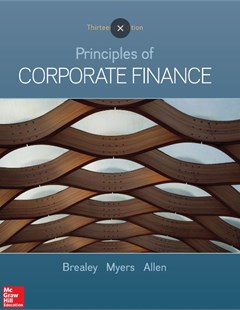Principles of Corporate Finance
This book describes the theory and practice of corpo-rate finance. We hardly need to explain why financial managers have to master the practical aspects of their job, but we should spell out why down-to-earth manag-ers need to bother with theory.Managers learn from experience how to cope with routine problems. But the best managers are also able to respond to change. To do so you need more than time-honored rules of thumb; you must understand why com-panies and financial markets behave the way they do. In other words, you need a theory of finance
2020
Principles of Corporate Finance, 13e, describes the theory and practice of corporate finance. We hardly need to explain why financial managers have to master the practical aspects of their job, but we should spell out why down-to-earth managers need to bother with theory. Throughout this book, we show how managers use financial theory to solve practical problems. Much of this book is concerned with understanding what financial managers do and why. But we also say what financial managers should do to increase company value.
Some of the biggest changes in this edition were prompted by the tax changes enacted in the U.S. Tax Cuts and Jobs Act passed in December 2017. In the current edition, we have also continued to augment the international content as well as a number of chapters that have been thoroughly rewritten. For example, the material on agency issues in Chapter 12 has been substantially revised. Chapter 13 on market efficiency and behavioral finance is now fresher and more up to date. Chapter 23 on credit risk focuses more on the practical issues of forecasting default probabilities.
This book may be your first view of the world of modern finance. If so, you will read first for new ideas, for an understanding of how finance theory translates into practice, and occasionally, we hope, for entertain-ment. But eventually you will be in a position to make financial decisions, not just study them. At that point, you can turn to this book as a reference and guide.
Managers learn from experience how to cope with routine problems. But the best managers are also able to respond to change. To do so you need more than timehonored rules of thumb; you must understand why companies and financial markets behave the way they do. In other words, you need a theory of finance.
The book includes:
Part One: Value
Part Two: Risk
Part Three: Best Practices in Capital Budgeting
Part Four: Financing Decisions and Market Efficiency
Part Five: Payment Policy and Capital Structure
Part Six: Options
Part Seven: Debt Financing
Part Eight: Risk Management
Part Nine: Financial Planning and Working Capital Management
Part Ten: Mergers, Corporate Control, and Governance
Part Eleven: Conclusion
Richard A.Brealey, Stewart C. Myers, Franklin Allen, Principles of Corporate Finance, McGraw-Hill Education, 2020
 |  |  |
| Nghệ thuật bán hàng bậc cao | Đầu tư bất động sản: Cách thức khởi nghiệp và thu lợi nhuận lớn |
Thứ Năm, 23:23 17/06/2021
Copyright © 2018 Hanoi University of Industry.